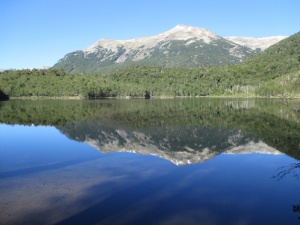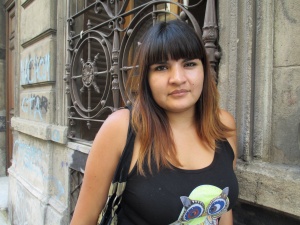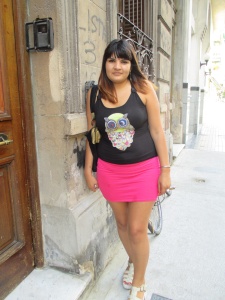I never would’ve thought twice about them if it weren’t for the lake. The lake, a wide glass mirror beaming a triumvirate of inverted mountains like flower petals right before they fall. The lake, days away from most other human life, so still it shakes you with the sound of your own mind. You trudge uphill for unbroken hours through woods denser with pines than the New York subway with people, and you start seeing faces in the bark. The red dots marking the trail have faded, but turning back you’re just as lost, so you make up songs like your 6-year-old self and hope you’re on the right path.
And finally you, your throbbing legs and your overstuffed backpack, wind up the final loop and arrive. The chill of altitude, the sting of the close sun, the wrinkled burnt fingers of peaks cradling you from all sides. The large log house by the pebbled shore: the refugio, where you will stay. Your home away from home. You are ready to see people!
You throw open the front wood door and holler an “Hola!” ready for some smiling hippie to greet you with a hot mate tea. You’ve walked here from El Bolson after all, Patagonia’s bohemian bowl: a town with a dreadlocked tango teacher, more guitars than computers, and clowns swinging on makeshift trapezes in the main plaza. There French and Israeli farmers feed you organic blackberries, young Buenos Aires transplants preach the existence of forest gnomes, and little ethereal children pedal bathtub-shaped yellow boats in a pond.
“This is one of the last refuges left in the world,” a former Grateful Dead groupie tells you as you take a break from singing the Beatles at his campsite on the edge of town. He’s a 1970’s flower child from Spain who lives in a tent with no phone or watch.
A natural refuge, a haven from technology and the “system” as we know it. The wild mountains free us, make frogs become sage spirits and the full moon a magnet lifting our feet to levitate.
So when I open the front wood door at the lake, I imagine a sacred respite with a few other hikers strumming stringed instruments. “Hola! Hola?” But no one responds. I walk in.
Staticky voices argue in Spanish on a cube in the corner: a soap opera with weak reception through DirectTV. Shutters are drawn. A woman in sweats dips a torta frita (fried bread) in jelly and chews. She sits alone in the house, eyes stuck on the screen. She looks my age. I sink.
“Hola, necesito una cama?” I ask for a bed. Finally she looks at me.
“Si. Claro.” Of course. What a stupid request, she knows I need a bed, but I am interrupting her show and her home, she seems to say. She shows me upstairs, where the soap opera seeps through the floorboards to the ear-to-ear mattresses, all empty but for one couple of sleeping bag caterpillars who speak only German.
“Where are you from?” I ask my hostess in Spanish, somehow hoping she’ll crack and warm as the temperature drops in the air.
“Buenos Aires.” The big city. Dark mess of hair in a forgotten ponytail, face of a middle schooler in math.
“And how long have you lived here?”
“Five years. You can pay later.” She retreats to her chair and looks at the TV, not flinching as a bear-like man with wood in his arms walks in the doorway.
“Hola,” I say with a small smile. He looks me up and down then gives an awkward nod and looks away. “This place was recommended to me by a woman from the restaurant La Confluencia in El Bolson, She said her son owned it. Is that you?”
“Yes.” He stuffs the wood in the furnace, and says no more.
Heaviness pulls on me even as I step outside, and I walk straight to the lake. I try to meditate them away, but first a deep deathlike sadness fills my exhalations. I stand on my head to wash it away. The lake is my best friend.
Well, I came here to be alone. And that is what I will be.



